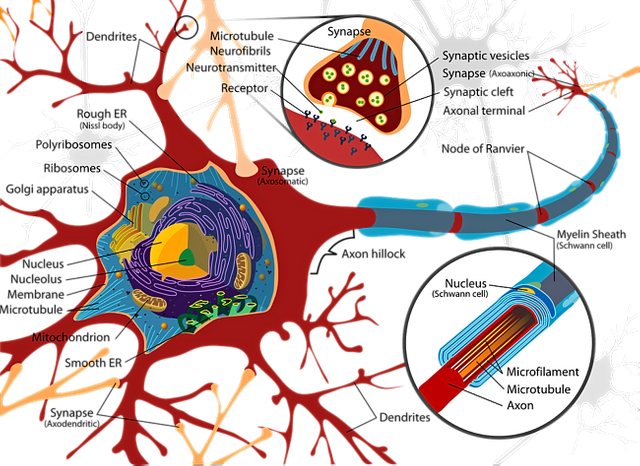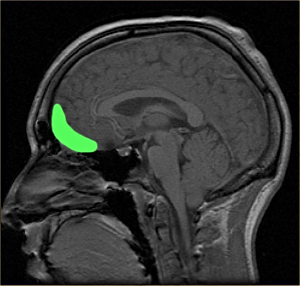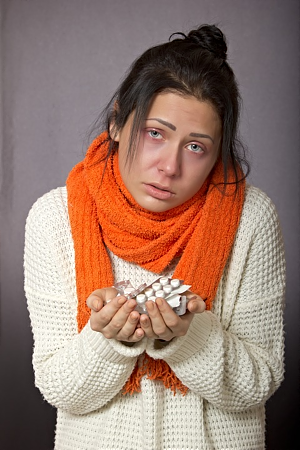Depression and the brain - new electrical stimulation findings
I have talked about depression before, I think I have around ten posts about it by now so I will try not to repeat myself too much and focus on those things that I have not said before. One of those things is a completely irrational thought that we can be psychologically healthy all the time. All our organs have their ups and downs and our brain is no different. We get sick from time to time when it comes to our lungs, nose, throat, kidneys, etc. Expecting that things like our brain chemistry and all the hormones that are produced by it, our cognitive abilities and emotional responses never change and we are always healthy is not a rational conclusion. It is wishful thinking.

CC0 image, Pixabay, author:422694
The stigma around mental problems has no place in the 21st century. If you had a broken arm, you would visit a doctor, do the same if you have a "broken" brain. Anxiety can turn to clinical depression if not taken care off, have that in mind and take care of yourself on time. Make an appointment with a psychologist now and again. If you ask me, people would have to have them on a regular basis just like they have other checkups. Today we will see what are the latest findings on locating specific areas in the brain that are involved with depressed states and what happens when they are stimulated.


Depression resulting from a chemical imbalance is just a figure of speech and should stay as such. The truth is, it is a complex disease with many possible causes such as faulty mood regulation by the brain, genetics, stressful life events, medications, and medical problems that come together in some ratios and interact together. The level of complexity is very high and there are billions of chemical reactions that make up the dynamic system responsible for your mood and perceptions.
The biology of depression is not complete
There are genes that make some people more vulnerable to low moods. They even influence how they respond to drug therapy. Similar symptoms of depression do not mean that the same treatments will work and treating everyone the same way has never and probably will never work. There is still much to be learned about the brain and with medical and technical advancement we are learning more and more about it almost every day. The positron emission tomography (PET scans) or the single-photon emission computed tomography (SPECT scans) can map the brain by measuring the distribution and density of neurotransmitter receptors in certain areas while functional magnetic resonance imaging (fMRI) tracks changes that happen when a certain brain region responds during various tasks. All of those have helped to discover how there are 3 areas in the brain affected by depression the most, the amygdala, the thalamus, and the hippocampus.
The activity in the amygdala is higher when a person is sad or clinically depressed and that increased activity even continues after recovery. The hippocampus is smaller ( 9% to 13% ) in some depressed people. Research suggests that with ongoing exposure to stress hormone the growth of nerve cells in hippocampus will be impaired. The way antidepressants work is they increase the concentration of neurotransmitters (chemicals that relay messages from neuron to neuron) in the synapses. Neurotransmitters that play a big role in depression are acetylcholine, serotonine, norepinephrine, dopamine, glutamate, and gamma-aminobutyric acid.

CC0 image, Pixabay, author: Clker-Free-Vector-Images
An electrical signal travels down the axon, the chemical neurotransmitter molecules are then released and the neurotransmitter molecules bind to receptor sites. The signal is then picked up by the second neuron and is either passed along or halted but it is also picked up by the first neuron which causes reuptake. In some people with depression, this process has problems. Receptors may be oversensitive or insensitive to a specific neurotransmitter or the message might be weakened because of too little of a neurotransmitter. The process of reabsorption of the remaining neurotransmitter molecules can be faulted too. This can be a result of various things such as genetics, stressful events, traumas or medical problems (viruses, degenerative neurological conditions, nutritional deficiencies, endocrine disorders, immune system disease etc.).


Since our brains are constantly producing electrical signals, it is no surprise (at least not to me) that the brain can be impacted by outside electrical impulses. Neurologist Vikram Rao and neuroscientist Kristin Sellers (from the University of California, San Francisco) conducted an experiment with implanted electrodes that had interesting findings. Patients first took extensive mood tests which showed some of them had signs of mild to severe depression and then the team began to stimulate different areas of the brain with the implanted electrodes. When the stimulation began, the scientists asked patients to report their current mood verbally and on a tablet app.
The lateral orbitofrontal cortex
Most of the targeted brain areas did not have any effect on mood but the lateral orbitofrontal cortex (OFC), a brain region that lies just behind the eyes (highlighted green in the picture to the right), did. People who felt good before the experiment reported no mood improvement but those that started with moderate or severe depression reported feeling better. This led scientists to believe how the brain stimulation works to normalize activity in mood-related neural circuitry.
"Stimulation induced a pattern of activity in brain regions connected to OFC that was similar to patterns seen when patients naturally experienced positive mood states. Our findings suggest that OFC is a promising new stimulation target for treatment of mood disorders."
-Vikram Rao, of the University of California, San Francisco
This was not the first time the electrical stimulation was used. Previous studies have explored deep brain stimulation (DBS) for mood disorders but found that success depends on a target selection. Previously stimulated target areas had not always led to reliable improvements. This time, OFC, usually regarded as one of the least well-understood brain regions, was stimulated. It showed how that area has interconnections with several brain regions implicated in emotion processing and can be seen as the key for mood-related circuitry.
Plenty of work still needs to be done before DBS could become a part of routine clinical practice. Researchers are exploring if stimulation of OFC produces durable improvement in mood over longer periods of time. They are hoping to develop a medical device that can monitor brain activity in OFC and stimulate it only when it is needed to keep that activity within a healthy range. You can read the full research here:
Direct Electrical Stimulation of Lateral Orbitofrontal Cortex Acutely Improves Mood in Individuals with Symptoms of Depression by cc, Kristin K. Sellers, Deanna L. Wallace, Maryam M. Shanechi, Heather E. Dawes, Edward F. Chang


The only thing that gives me a slight worry is the quote from one of the researchers. It implicates that there is a wish to treat patients in a way that they would not need to do anything. I see this as a potential problem.
"Ultimately, it would be ideal if activity in mood-related brain circuits could be normalized indefinitely without patients needing to do anything"
-Vikram R. Rao
Why do I fringe at this?
Because of personal experience and common sense (my version of it at least) and yeah, I know it is a subjective standpoint. I would not dare to proclaim it objective or scientific, it is just my two cents on the matter at hand. I have seen a lot of people with depression and what was not surprising was the fact that those who relied only on medication showed no improvement of their condition or their symptoms came back. The reason for this is that without a change in our behavior, thinking patterns and daily responses to the stressful situation, medication will not make us better, not in the long run anyway.
With our same ways of functioning, we will cause our brain problems over and over again. People fail to realize that the brain is a living, functioning, and adaptive organ. My logic is that if you keep banging your head on the wall, you will cause it harm. There would be blood, hematomas, and pain. You can fix those, sure you can. They will, however, come back if you again start banging your head against the wall. You should take medication for depression but you should also put some effort in and work on changing your thinking patterns that caused or helped to cause depression in the first place (in cases where it is not caused by medical conditions, viruses, and diseases). Patients should be held accountable and take responsibility for their conditions. Giving them treatments as an easy-fix only encourages circular behavior of problem-solution-problem-solution where the solution is not permanent but the problem is.
What should patients do?
Depression is treatable. I was diagnosed with severe clinical depression and was on antidepressants for years that helped me leave my depression, agoraphobia, panic disorder, and psychosomatic digestion problems far behind me. While taking the medication, I was also working on changing my thinking patterns, problem-solving, and reactions to stressful situations. I took responsibility for my actions and thoughts. I saw medication as treating the symptoms and me working on my life as treating the cause. I would suggest all patients to do the same. It is easy to reject responsibility because we can blame the doctors and the pills for not helping if we see no progress. I see that often. A person takes the pill, changes nothing in her life, the symptoms do not go away or they do but come back. The person then blames the pill and the doctor. Some people just keep on banging their heads on the wall and expect it not to bleed...
To read more about this topic, check out these REFERENCES:
What causes depression? from health.harvard.edu
Zaps to a certain spot in the brain may ease depression from sciencenews.org
Effective new target for mood-boosting brain stimulation found from sciencedaily.com
Until next time,
KEEP YOUR SMILE ON!



Image sources AND LICENCES in order of appearance:
- all images used in this post are free for commercial use, they are royalty free with the links to original images provided under them
- line divider that I use is from FREE CLIPART LIBRARY, and is here
- title pictures are made by me using the CC0 image from pixabay that can be found here
- my bitmoji avatar was created on https://www.bitmoji.com/, visit the site to create yourown
PROUD MEMBER OF:



@steemitbloggers





I have always wondered what if any affect all these radio waves from phones and computers (Wi Fi ) are doing to our brains and bodies. They could very well be a cause of depression too.
I know studies have been done about phones and cancer but what about depression? Do you know if any studies have been done in that area?
I have not heard about them but nothing surprises me anymore :D
Another wonderful thought-provoking post, and I'm totally with you on the idea of treating depressed patients without any input on their part. Although I would suggest another reason why this could be a bad idea. In my experience, some types of depression seem to be a kind of process that the mind goes through on the road to creativity and new insights. I'm not saying that creative people should just suffer, but I think depending on the severity of the depression, some types of therapies can help depressed people learn more about themselves. Yes, I'm talking from experience here!
Every growth is amazing, those that grow through depression and accept it as such growing and developing opportunity can benefit the most. The question is do people accept the growth and change or see it as a disaster and think how nothing will help them :)
Most expert-organized information and a easy to follow read. It is such a pleasure to spend a time and learn with you, @zen-art!
Hey, @anutu. I think you'd love to have a read here!
I have noticed it before, why do some of your mentions do not work? Like this one where you mentioned @anutu? :) Anyway, thank you for your kind words honey, they are really appreciated 💚
One possible explanations is because I left three dots after the tag. Sorted out now :-)
This one worked. Could be also because I had no signal and a crashed computer again ... hihi. Still not able to re-install discord, logged in online. Three days without Gina .... ughhhh still all weak here, soryyyyyy
Good that you are back :-)
Another amazing article of yours @zen-art!
One of the best statements regarding dealing with depression.
Unfortunately, I have dealt with severe depression as well, which came to the point where I was not being able to get out of the bed in the morning, eat, or take a shower. All I could think about was death.
I was prescribed with two different antidepressants at the same time + some horse sleeping pills, since I was suffering of insomnia as well.
Medications helped me with initial improvement of my symptoms, just enough so I can start working on recognizing my issues and changing things in my life.
Only after I have achieved some goals I assigned to myself, I started to feel that recovery is near.
This is a very difficult thing to do, even for healthy peopIe, and especially for those suffering from this serious mental condition.
That's why I appreciate this article very much, because I think it's important for people to read more about these things and find strenght in other people's experiences to deal with their own issues.
Yeah, I remember not being able to go to the bathroom too... It was hard and challenging to get out of that state but medication helped, it helped a lot. I was supposed to be hospitalized but my agoraphobia from back then made it impossible (luckily). Thank you for generously sharing your experience, I agree that people should talk and read more about this topic and your words help with that. From one "survivor of the beast" to another, much love to you. I am proud of us both 💚
Gosh @zen-art, you really should consider publishing all this valuable and concise information, thank you so much! Depression is a complex illness so I don't think one can ever say too much about it!
Hahahaha, yeah, that idea has crossed my mind but finding a publisher who is willing to do that would take more time than I currently have. Maybe someday. Thank you for your kind words 💚
I've had severe depression for over 60 years and have taken all the drugs, therapies and people in white coats and none of it worked. If I had the money I'd do this stimulation thing, but I'm not holding my breath about it
I am sorry to hear that. I know people who are struggling with it like you for decades and what saddens me the most is how a lot of them (I do not know if that is the case with you) have given up and identified themselves with their illness. It is a part of them now and they have a strong belief that nothing can help them. With that attitude, nothing really will. I do hope that at least your good days come more often than the bad ones and that you will find the way that works for you. Sending you much love and wishing you much success. 💚
Congratulations! Your post has been selected as a daily Steemit truffle! It is listed on rank 11 of all contributions awarded today. You can find the TOP DAILY TRUFFLE PICKS HERE.
I upvoted your contribution because to my mind your post is at least 6 SBD worth and should receive 186 votes. It's now up to the lovely Steemit community to make this come true.
I am
TrufflePig, an Artificial Intelligence Bot that helps minnows and content curators using Machine Learning. If you are curious how I select content, you can find an explanation here!Have a nice day and sincerely yours,

TrufflePigCongratulations @zen-art! You have completed the following achievement on the Steem blockchain and have been rewarded with new badge(s) :
Click here to view your Board of Honor
If you no longer want to receive notifications, reply to this comment with the word
STOPTo support your work, I also upvoted your post!
Do not miss the last post from @steemitboard:
Would you say it correlates to boredom? Motivation? Frustration? Self-esteem? All of those and more?
I am all about the behavior kind of treatment, although I must admit I fall in 'I need to drink this... or eat this...' states that weigh on my mind.
And, surprisingly, depression comes to me due to over-stimulation with what I want. Can I want something better, then? For myself and for the others? As of now, yes, I can. So I should.
I haven't known real depression myself, I must also admit. So I don't quite understand it.
I would not say it correlates to boredom since brain imaging of boredom and depression is not the same but I guess there are similarities in behavior because people with depression can not do anything which is often portrayed as boredom or laziness even though they really can not do anything. They do not have even strengths in their muscle and sleeping patterns change. People with depression can sleep over 15 hours in day. Chemicals in the body need to be treated. I do know some people who managed to help themselves without medication but the statistics say they are a minority. Even with the medication, you have to work hard and invest time and work, people do not. Without medication, that work needs to be 24/7 and I am skeptical because I have seen more people not doing anything than those who try.
Congratulations! This post has been chosen as one of the daily Whistle Stops for The STEEM Engine!
You can see your post's place along the track here: The Daily Whistle Stops, Issue 330 (12/04/18)